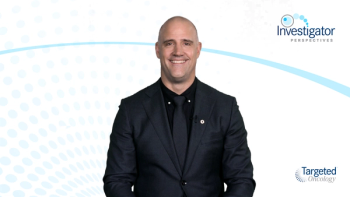
The Future of Therapy for Advanced RCC
Robert J. Motzer, MD, shares his insights on the future of treatment for advanced renal cell carcinoma.
Robert J. Motzer, MD: In terms of where the field is going, there has been a really rapid change in the first-line treatment options for patients with kidney cancer in the last couple of years. This has been an evolution from TKI [tyrosine kinase inhibitor] monotherapy to checkpoint [inhibitor] combinations. They have really expanded treatment options for patients and raised questions as to whether 1 particular approach is better than another. My hope is that over the next couple of years we will be able to continue the biomarker work which consists primarily of RNA sequence analysis in the last couple of years to see if we can better “tease out” patients who may do better with pure IO [immuno-oncology] therapy approach versus anti-angiogenesis IO combination like lenvatinib plus pembrolizumab. There is some work that has been done to date that suggests there is a signature for patients who do better with anti-angiogenesis therapy than those that don’t have that signature, and a signature that maybe represents more of an inflammatory tumor that respond better to IO therapy. There are a number of different studies that have shown that and are being refined to hopefully give us further direction in terms of which approach is better for which patient. In addition, the whole area of first-line therapy has changed quite dramatically in the last couple of years. It really raises the question about what’s the best approach for patients who progress on an IO therapy that is given in [the] first-line. Most of the options that we have previously established—cabozantinib, lenvatinib plus everolimus, and nivolumab—were all established as beneficial therapies in patients who had progressed on TKI therapy but not IO therapy. There is a question in terms of whether there is a role for continued IO therapy afterwards, and along that line there has been very compelling data for the program of lenvatinib plus pembrolizumab in patients who have progressed on prior IO therapy. There was a large trial that included over 100 patients who were treated with lenvatinib plus pembrolizumab after progressing on prior IO therapy that showed a good response rate and relatively long progression-free survival. This area is being studied in phase 3 trials. There is a trial that is underway called the CONTACT trial that looks at cabozantinib plus atezolizumab versus cabozantinib [alone]. In this space, there is also a study that will be starting very soon. It’s comparing tivozanib, which is a recently approved tyrosine kinase inhibitor in heavily pretreated patients either in monotherapy or in combination with nivolumab. There will be some trials that will look at that question in terms of the role for continued IO therapy. In addition, we need to identify new agents that have activity, and in my mind the highest contender is the HIF [hypoxia-inducible factor] inhibitor that was recently shown in a phase 2 trial with good activity. It was referred to as MK-6482, or belzutifan, and this is being studied now in combination programs in patients who have progressed on IO therapy. Lastly, the area of much excitement is in the adjuvant space. Tyrosine kinase inhibitors failed to show a benefit in the adjuvant setting with the exception of 1 trial [that] looked at sunitinib, but there seems to be a strong rationale for IO therapy in patients with locally advanced kidney cancer that are rendered free of disease by nephrectomy. There was exciting data presented at the Plenary Session at ASCO 2021 that showed a benefit in relapse-free survival for patients treated with pembrolizumab compared to placebo. That may open up the door for a change in standard of care based on that program, and certainly there are 3 other large phase 3 adjuvant trials that are looking at different IO or IO combinations that will read out and hopefully support that data in terms of showing a benefit for IO adjuvant therapy as well. I think it’s an extremely exciting time. There has been so much advancement in the treatment of RCC [renal cell carcinoma] over the last 5 years and so much interest from academic investigators, patient advocacy groups, and patients in terms of these new therapies and where the field is going in RCC. I would like to thank you for your attention today, and I wish you the best.
This transcript has been edited for clarity.








































